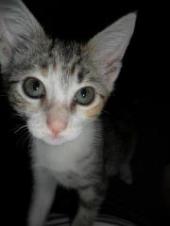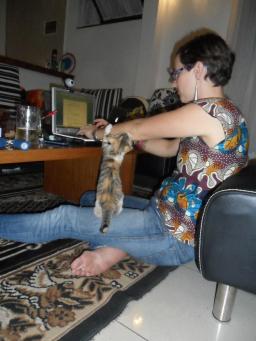If you think living in Kinshasa seems exotic or a whole other world then this post will cure that fantasy. This post is also not about Che Guevara’s attempt to organize guerillas in Congo for those that stumble upon this while googling. This post is just a regular tidbit on my quotidian life; it is about my Cat.
One night early on in this small feline’s street life, a crazy pair of Mudelés (white people in Lingala) came along in a somewhat tipsy state and scooped her up outside a popular night club called Ibiza Bar in downtown Kinshasa. Despite being filthy she was absolutely adorable and totally happy and calm in my arms.
Instantly there were 3 or 4 Chégués claiming her as theirs. Of course one generously offered to sell her to me for only 10$, “No! She’s mine, you can have her for 5$” shouted another. “She’s actually mine and she 20$ whispers one in my ear”. My pleading eyes told my Mundelé to go negotiate and off he went to discuss this with the Security manager of the bar who seemed to have the most legitimacy.
10$ later we came home with a new addition to our urban apartment, an indoor cat!
The thing is that the cat is a Chégué or in her case, a Chécat. Chégué is the word used for street kid. I have heard an etymological explanation claiming it comes from the Hausa language used in Niger that means ‘bastard’. Congolese reject this saying it just means street kid…either way in Kinshasa alone there is an estimated 14 000 Chégués (the World Bank estimates some 40 000 in all of DRC according to its 2011 report).
Kinshasa has a large boulevard called le Boulvard de 30 juin (Congo’s independence day). This is the boulevard that us Mundelés take to and from work every day. This is a downtown 8 lane highway (I may have described this in a previous post). There are actually working traffic lights that manage to control traffic at times. Some might call this a government scheme (by government I mean Chinese construction company) to make alternative livelihoods accessible to young people. Others would call it just an indirect impact of development. Every time traffic stops Chégués slink between the lanes tapping on all the car windows begging for money looking so hungry and sad, It depends on which stretch of the boulevard you’re on but closer to our office the kids are smallest, 8-13 yrs probably. As we near our house they tend to get bigger and bigger, tougher and tougher. Once they’re big you can imagine that its harder to have sympathy for them…but when they’re small they ‘do evoke a certain uneasiness that often gets me fishing around in my purse for some food. I have given out a few francs here and there but since they always say they’re hungry I like to give cookies I save from UN flights I take (part time WFP distributer). Sometimes I give a half a sandwich or some fruit; not surprisingly this goes over very badly, as the child actually just wants money.
This might start to sound like a TIA experience but I assure you the same scenario played out one time in Ottawa when I gave a young boy an apple when he told me he was hungry, he threw it back at me and I understood that what he really wanted was money by the look of his junky eyes probably for drugs or alcohol….
Often the kids here are working for their families or for big Chégués. These big Chégués can give you something to worry about; around them we Mundelés roll up the car window and lock the door. In our neighborhood they are often getting into fights, getting beat down by the police or acting all cool while smoking a bunch of pot and acting aggressive.
Which brings me to the point of this post, my Chécat, who still small, evokes feelings of uneasiness but as she is starting to grow she is beginning to evoke feelings of fear. She is not smoking pot as far as I can tell (although who knows what she does while we’re at work) but she is becoming very aggressive! My legs look like I’ve fallen on a rose bush and there seem to be permanent teeth marks on my arms. She is constantly eating garbage and I’m worried this is causing some serious intestinal problems…
The big question is, is this just how cats are or is this something to do with her being a Chécat? IS this an early cathood development issue? Personality disorder, social awkwardness, rage, turrets??? It begs the question. Can we save our Chécat or is she lost to the streets?

